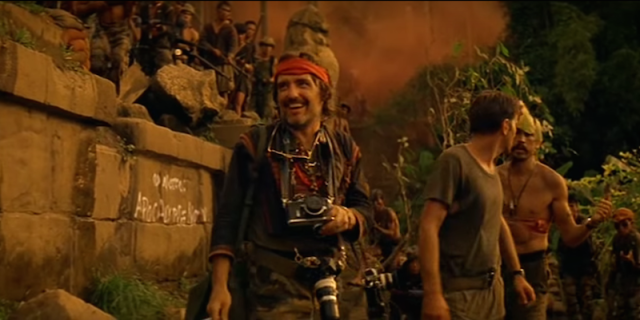After much thought, I decided to switch my artifact for the research paper from John Erick Dowdle’s No Escape (2015) to Francis Ford Coppola’s Apocalypse Now (1979) because I think this film is more suitable for what I want to research, which is how and why the media actively shapes Americans’ perception of historical events. I am also especially interested in the role Orientalism plays in this process. Unlike No Escape, Apocalypse Now has a lot more historical significance because it was released shortly after the Vietnam War (1955-1975) and is considered one of the most famous films about the Vietnam War. In addition to that, there is more room for debate about the significance of the film and its portrayal of Southeastern Asians. While exploring this topic, I intend to consult Edward Said’s Orientalism (1978), debates about “otherness,” scholarly interpretations of Apocalypse Now, historical evidence about Americans’ attitudes toward the Vietnam War, and biographical information about Francis Ford Coppola.

Francis Ford Coppola is an accomplished director, producer, and screenwriter; his most famous works include The Godfather trilogy and Apocalypse Now. Coppola’s Apocalypse Now—starring Marlon Brando and Martin Sheen–is an award-winning Vietnam War film that follows Captain Willard’s expedition along the Nung River to reach Colonel Kurtz, whom Captain Willard has been ordered to kill. The majority of the film focuses on the upstream journey, which represents the soldiers’ departure from civilization and descent into madness. Most of the movie was filmed in the Philippines, although some footage was shot in the Dominican Republic and the United States. Apocalypse Now was largely inspired by Joseph Conrad’s Heart of Darkness (1899), which explores the scope of man’s evil through its portrayal of Belgian imperialism in the Congo.
Since Apocalypse Now is one of the most famous Vietnam War films, I am interested in how its contemporary audience reacted to it, especially since it was released so shortly after the end of the Vietnam War. My working thesis is that Apocalypse Now reflects anti-Vietnam War sentiment its contemporary audience would have felt; however, it shifts the focus from soldiers’ physical injuries to their psychological trauma, at the expense of the Vietnamese. Although the combat scenes are portrayed spectacularly, the film undoubtedly highlights American soldiers’ psychological turmoil. In the film, Vietnamese characters are dehumanized and primarily used to advance the Western plot. For instance, as Captain Willard and the accompanying soldiers make their way up the Nung River, the soldiers kill Vietnamese passerbys because a woman protests while they are searching their boat. Although that woman survived, Captain Willard mercilessly kills her, presumably because it would be inconvenient to provide her with the medical attention she needs. Even when these soldiers kill Vietnamese civilians by mistake, evil triumphs when Captain Willard gives into his selfish desire to kill the Vietnamese woman merely to advance his mission. In addition to that, the fact that the soldiers become increasingly brutal as they travel up the Nung River implies that the Vietnamese are somewhat at fault for the soldiers’ transition into a more savage state of being. I am curious about the implications of this portrayal of war shortly after the Vietnam War, such as whether it influenced or changed the national attitude toward the war.
